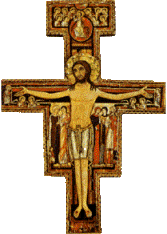These days one rarely hears about the practice of 'doing penance'. Its value is belittled. Its necessity is questioned. Its effectiveness is ignored. Yet St. Francis placed the highest importance on 'doing penance' and preached it as indispensable in the spiritual life.
One interesting and helpful insight into how Francis judged the matter is noted in Legend of Perugia: [cf. #96 – Brother Body]. To paraphrase Francis: The body is meant to serve God but can easily be impeded or distracted. This is the devil's playground. In matters of '…food, sleep and other necessities, the servant of God must act with discretion so that Brother Body has no excuse to complain' (i.e., we should avoid being unjust to our bodies). He continues… if on the other hand the body gets what it needs while observing moderation, and yet responds by '…being lazy, negligent, sleepy during prayers, vigils and other good works, then it must be chastised like a bad tempered and lazy beast of burden that wants to eat, but refuses to carry its burden.'
From this we can see that 'Brother Body' is called to glorify God. The body is 'weak and fallen' yet eternally destined to share in the joy of eternal life. Penance as mortification is indeed a virtue if it serves to move us (as it should) in the right direction and keep us on the path to God. Any other 'chastisement' can quickly descend to a misguided endeavor and defeat the goal of serving God joyfully. Of course it doesn't help when the virtue is itself distorted by bad practice. It is meaningless when deprived of the vital elements of love and contrition: of heartfelt sorrow for one's sins (not sin in general but my sins in particular).
The Church has clung to the practice of penance insistently, providing seasons and days for its observance. We see scriptural evidence of the 'People of God' often being called to prayer and fasting as a measure to correct waywardness and counter the influences of the surrounding culture. We can't ignore how our current culture of consumerism and materialism has launched a frontal assault on anything remotely resembling the practice of 'doing penance'. Contemporary opinion of the practice is often seen as unnecessary and ludicrous; outdated and old fashioned; even backward and harmful. Yet, when the practice of 'doing penance' is put into actual usage, it quickly loses its absurdity and induces a sense of wisdom and good judgment.
It's not for me to judge how God may inspire any other individual to carry out the practice of penance. What I can judge however, is my own response (or lack of response) to what is certainly a tried and true virtue. Something to consider is the effect that the original lay followers had on St. Francis. The Brothers and Sisters of Penance were fervent practitioners of penance. St. Bonaventure notes that they received great inspiration from Francis which in turn inspired him to practice the virtue to a 'heroic degree.' [cf. Major Life of St. Francis; Chapter V, 1]
Penance as sacrifice or mortification; when aligned correctly in a spirit of love and contrition will undoubtedly fly in the direction of God. Even if the penances are 'soft': when launched with a 'humble and contrite heart'- the angels will gather them and deliver them to the hearts of Jesus and Mary, where they will be used for God's own divine purposes.
Still not convinced of the benefits of this virtue? All I can say is that this is one area where practice trumps knowledge. This brings us to another Franciscan trait: the habit of doing virtue rather than merely pondering it. As the Seraphic Saint said, "I would rather feel compunction than study its definition."
"Let us begin anew, for as yet we have done nothing."
Reclaiming Penance as Virtue
Subscribe to:
Post Comments (Atom)





No comments:
Post a Comment